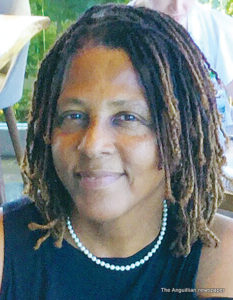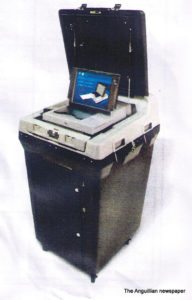
With a year or so left for the general election in the seven constituencies and the island-wide voting in Anguilla in 2020, the Supervisor of Elections is getting busier and busier – and by next week the training of Returning Officers and other election officers will commence.
The preparatory work is being carried out by Supervisor of Elections, Ms. Aurjul Wilson, who, among other things, is awaiting the approval of the Government’s 2019 Budget to obtain funds for some additional equipment. On Monday, March 18, she spoke in an interview with The Anguillian newspaper which covered some of the main election matters, as well as her recent trip to the British Virgin Islands where she gained insights into similar electoral arrangements.
“We are moving ahead. On Friday, March 15, I was summoned to Executive Council and the topic was the draft Elections Bill. They went through the proposed Election Bill line by line to see whether or not it was what the Government wanted,” Ms. Wilson reported. “I was invited because I needed to explain what the process currently is – where I was in terms of preparation and any difficulties I may have.
“My major concern was the intervening time between the passing of the law, and preparations to facilitate it to acquire any additional equipment I need and to have the budget appropriations made. As you know, the budget is yet to be approved but it will not have the correct figures for the Central Electoral Office. Although there is nothing that I can say officially, I have been advised that I can commence working towards the necessary equipment and the manpower required.
“I can tell you that we will have advance voting which does not require any constitutional change. I think the Government’s concern is not to announce changes without having received the necessary constitutional go head. Hopefully, we will complete the consultations for the Bill to go to the House of Assembly by or after April 10. Internally, I have to get additional equipment and manpower to facilitate the advanced voting. It is where you would have the infirmed and persons over 70 years, as well as nurses and doctors and the essential election officers, who will not be easily available to stand in line on polling day.
“I am anticipating that the advanced voting will take place on the Thursday before the elections on the Monday. But before the advanced voting, persons would need to apply to the Central Registration Office because we will have to vet the people who are going to vote. Once they are qualified, are a police officer, a nurse, doctor, emergency medical technologist, physically incapacitated or over 70 years old, they will be given a card in addition to their ID card. That voting will take place in the House of Assembly.

& Storage
“It will take a similar form like when nominations are being done with all the Returning Officers present except that there will be two ballot boxes –one for the district voting and the other for at large voting. The hours for the advance voting are 9 am to 2 pm. Once those polls are taken, they are locked away in safe place until the Monday elections when those votes will be put into the district and at large boxes for counting in the various districts. Because we are such a small community, unlike some places where the advance ballots are counted first, we will just add the ballots to the district boxes and the island-wide boxes respectively for the general counting.”
The Supervisor of Elections continued: “What we will be doing differently from the previous elections [in 2015] is that we will be counting the votes at the respective districts. That will be good because people in the community will get in on the excitement because not everybody can come to a central location. So we will be counting in all seven districts. We are working out the logistics regarding how we can stream the ballot counting from each district. We will be doing this via social media basically. Of course there will still be the overall tallying of the votes where traditionally the Department of Information Technology disseminated the information.
“When the polls close at 7 pm persons will have an opportunity to refresh themselves, and within half-an-hour we should start counting the ballots. I don’t see us going beyond an hour to count the votes in the smaller constituencies. When we finish there, we should know who would have won in those districts before proceeding with the counting in the island-wide district.”
The rest of the interview with Ms. Wilson continued as follows:
What about the counting of the island-wide ballots?
That counting will take place at a central location.
Have you learnt anything from being in the BVI for the island-wide voting and counting?
Yes, absolutely. I think going there was probably one of the most productive and informative things that can assist locally. First of all, the BVI legislation basically mirrors that of Anguilla. When I found out that the BVI was implementing a number of new initiatives that we in Anguilla were contemplating for the 2020 elections, I thought it was a great opportunity for me to travel there. The Governor’s Office and the Government of Anguilla funded the one-week trip.
“There were many things like the situation in Anguilla, yet dissimilar. For instance, before the night of the elections the Supervisor of Elections was there from one o’clock. I got there at 2.30 because they sent someone to pick me up at 2 o’clock, and I was there until 10 o’clock the next night. They had manual voting but electronic tabulation using the DS200 machine which is what we will have for the island-wide tabulation.
Tell me what the DS200 machine will do for voting in Anguilla, and how it functions.
It will make the tabulation of the island-wide ballots easier and quicker. The Returning Officer will place the island-wide ballots through the DS200 machine which will capture who was voted for. It will record the information on a flash drive which will be read by a computer, creating a report.
How advanced would you say are your preparations for elections?
It is a lot of work, but I am glad that we started early. I have started training. I met twice with the Returning Officers, and on Wednesday, March 25, we will start our first meeting with our Election Officers. We need to go through the new legislation. About 90-95 percent of them would have worked with elections before. The training will continue during the rest of the year.
What would you say is the highlight of your work as Supervisor of Elections?
I think it is the ease with which we can vote with no more waiting in long lines. Last election we had ink for voters to dip their finger in. There will be no ink this time as we have a more sophisticated system. I want the voting to be simple, and even fun – as opposed to having it long and boring. Persons should come out to vote early.
Meanwhile, how are voters responding to the need to register to vote?
People are coming in for the registration cards and I think, as of today [Monday, March 18], 72 persons picked theirs up. You have to sign for your card. Nobody can take it for you. Some people asked me when the last day is. Don’t wait until then. Come and get it. It is your card.
What if a person lost his or her card?
The initial card is free. There is a fee to replace it – that is the cost for reproducing the card. If you lost it and want to replace it, you have to pay for the replacement. Nobody can impersonate you because we have your information.
Do you see the coming elections exciting?
Yes. There will be a change in the system and that is what makes it exciting. As I told my staff, our biggest frustration now is acquiring the equipment. This includes polling booths and new ballot boxes. Instead of using those heavy ones, some of which have termites, we want the ones that are light-weight and collapsible. We want to buy things that can be easily stored and could last much longer. We will use some of the old boxes, along with the new ones, because we will need them for both the district and island-wide voting.







